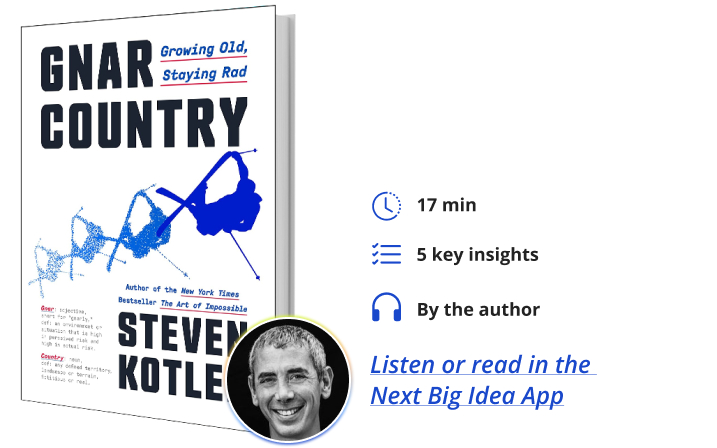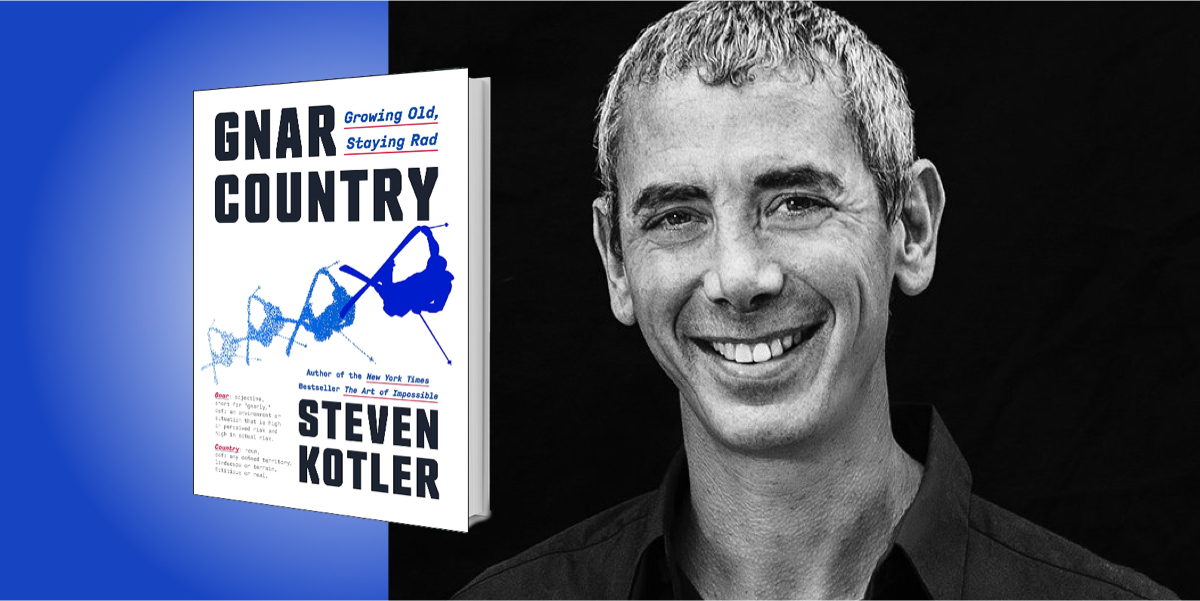Steven Kotler is a New York Times bestselling author, an award-winning journalist, and the Executive Director of the Flow Research Collective. He is one of the world’s leading experts on human performance. He is the author of nine bestsellers, including The Art of Impossible, The Future Is Faster Than You Think, Stealing Fire, The Rise of Superman, Bold and Abundance. His work has been nominated for two Pulitzer Prizes, translated into over 40 languages, and appeared in over 100 publications, including the New York Times Magazine, Wired, Atlantic Monthly, TIME and the Harvard Business Review. Steven is also the cohost of Flow Research Collective Radio, a top ten iTunes science podcast.
Below, Steven shares 5 key insights from his new book, Gnar Country: Growing Old, Staying Rad. Listen to the audio version—read by Steven himself—in the Next Big Idea App.

1. Long slow rot theory is simply wrong.
The place to start is with the traditional ideas about aging, or what I like to call the long slow rot theory: the idea that all our mental and physical skills decline over time and there’s nothing we can do to stop the slide.
This idea dates back to Sigmund Freud. In 1907, a few months before Freud’s 50th birthday, he wrote: “About the age of fifty, the elasticity of the mental processes on which treatment depends, is, as a rule lacking. Old people are no longer educable.” Freud believed that anyone over fifty was so beyond their sell by date that even therapy was impossible.
Freud’s statement is the origin of the long slow rot theory and the birth of the notion that you can’t teach an old dog new tricks. Yet, nothing could be farther from the truth. For starters, Freud himself wrote many of his most famous and important books in his fifties and sixties.
All of our mental and physical skills do not decline irreversibly over time. Sure, these skills do begin to decline, and not in our fifties—in many cases, as early as our thirties. But that’s only a starting point. The truth is that all of these skills are use-it-or-lose-it skills. If we never stop using these skills, we can hang on to them and expand them far later into life than anyone thought possible.
Better still, since the brain figures out how to compensate for some of what is lost, we can perform as though we’ve retained an even greater percentage of those skills. But you need to train for your later years with the conviction of a professional athlete because once you reach fifty, if you’re not moving forward, you are sliding backward.
2. Mindset matters.
If you’re interested in peak performance aging (getting our biology to work for us rather than against us in the second half of our lives), then you have to understand, as Harvard psychologist and one of my great heroes, Ellen Langer, once said: “Aging is as much a mental event as a physical process.”
One of the wildest examples of this is the Ohio Longitudinal Study on Aging and Retirement, which ran for twenty years—between 1975 and 1995—and, among many other things, examined the relationship between mindset, health, and longevity.
“Changing your mindset toward aging has as much impact on longevity as quitting smoking, and more impact than losing weight, even if you’re obese.”
In this study, a positive mindset toward aging—meaning, I’m excited about the possibilities in the second half of my life, and I believe my best days are ahead of me—translated into an extra seven and a half years of health and longevity. This finding has shown up again and again. Changing your mindset toward aging has as much impact on longevity as quitting smoking, and more impact than losing weight, even if you’re obese.
This is critical for many reasons, but the most crucial is that agism—which is a negative stereotype toward aging—is the most common and socially acceptable prejudice in the world. But it’s a prejudice. A blind bias based on fear and misinformation. And it’s contagious. When you treat people in their later years as if they’re old and slow and decrepit, this gets internalized by the victim and has a direct negative impact on their mental and physical well-being. We’re dying young—as societies—because we’re mistreating older adults.
3. A positive mindset toward aging isn’t a platitude.
Research shows that our later years are a new stage of adult development, where three profound and positive changes take place in the brain. First, certain genes activate only by experience, which means the brain remodels itself over time, adding depth and wisdom to our personalities as we enter our later years. Second, the brain learns to recruit regions underutilized in our earlier years, and this can more than compensate for the cognitive decline that comes with age. Third, the brain’s information processing capacities reach their greatest density and height between ages sixty and eighty, allowing the two hemispheres of the brain to work together like never before.
These neurobiological changes unlock three types of thinking that are mostly inaccessible before our fifties. More importantly, all three types of thinking continue to improve with age, as long as we continue to cultivate creativity—which is what’s required to train these thinking styles:
- Relativistic Thinking: We learn to better synthesize disparate views. We learn that there are few absolute truths, mostly relative truths, and that black-and-white thinking is a folly of youth.
- Non-Dualistic Thinking: We learn to consider opposing views without judgement. We learn to see both sides of the same coin. We learn empathy.
- Systematic Thinking: We learn to think big picture. We learn how to see the forest through the trees. We learn to think divergently.
This work changed the conversation around peak performance aging. It’s no longer a question of what we can do despite our age. Now, it’s about what we can do because of our age. Or, as psychologist Gene Cohen explains in The Mature Mind, his classic book on the subject: “Dozens of new [neurological] findings are overturning the notion that ‘you can’t teach an old dog new tricks.’ It turns out that not only can old dogs learn well, they are actually better at many types of intellectual tasks than young dogs.”
4. As we enter our fifties, we gain access to a suite of cognitive superpowers.
In simple terms, our ego starts to quiet, and our perspective widens. We gain access to new levels of intelligence, creativity, empathy, and wisdom. As a result, key downstream skills like critical thinking, problem solving, creativity, communication, cooperation, and collaboration all have the potential—if properly cultivated—to skyrocket in our later years.
To produce the necessary brain shifts for accessing these superpowers, we must first pass through a series of gateways, or what psychologists call moderators—meaning if/then conditions.
“The mental skills that come online over fifty are crucial skills in the twenty-first century.”
By age thirty, we need to have figured out who we are in this world, solving the crisis of identity. By age forty, we have to figure out how to make a living that is seriously aligned with our big five intrinsic motivators: curiosity, passion, purpose, autonomy, and mastery. By fifty, we need to forget old grudges and generally clear our emotional slate.
This is a business revolution waiting to happen. The mental skills that come online over fifty are crucial skills in the twenty-first century. In talking to thousands of CEOs about peak performance and the qualities they need most in their employees, I’ve heard the same thing over and again. CEOs need intelligence and creativity to drive innovation and help their organizations keep pace with the accelerating rate of change in the world. They also need empathy and wisdom because company success depends upon team performance, which requires collaboration and cooperation and psychological safety. Additionally, customer-centric thinking is a mantra for business, but without empathetic employees, no one can think like their customers.
In short, the over-fifty crowd is the dream workforce of this century.
5. We need lifelong learning.
Learning produces both expertise and wisdom. Think of expertise as all the stuff you learn consciously, and wisdom as the stuff you learn non-consciously—this is a practical way to differentiate them. Expertise and wisdom are complicated neurobiological traits that create broad and expansive neural networks across the prefrontal cortex. The prefrontal cortex is the brain area most vulnerable to cognitive decline. These expansive networks create lots of redundancies…backup plan after backup plan, and this provides the very best protection against the ravages of time.
The fastest way to get expertise and wisdom in our later years is to engage in challenging creative and social activities that demand dynamic deliberate play and take place in novel outdoor environments.
Challenging, social, and creative activities drive us into a flow state—which is the technical term for an optimal state of consciousness where we feel our best and perform our best. The state is crucial for peak performance aging for a dozen different reasons, but the most important might be that the state itself produces feelings of mastery and control, which are two of the most positive feelings humans can experience. Powerful positive emotions produce T cells (which fight disease) and Natural Killer Cells (which target tumors and other sick cells).
“To stave off cognitive decline, we need to create new neurons and we need those neurons to form networks.”
Dynamic deliberate play is also very specific. Dynamic means that it requires all five categories of functional fitness— strength, stamina, balance, agility, and flexibility. These are all the use-it-or-lose it physical skills that we need to regularly train as we age. Deliberate play is defined as repetition with improvisation. It’s a slightly different approach to expertise than psychologist Anders Ericsson’s deliberate practice—which is repetition with incremental advancement. Deliberate practice is great for training certain types of expertise, but as a rule, deliberate play—because we learn better when we’ve set down self-consciousness and embarrassment to truly play.
Finally, these dynamic deliberate play activities should take place in novel outdoor environments because of neurogenesis, or the birth of new neurons. To stave off cognitive decline, we need to create new neurons and we need those neurons to form networks—linking new memories to old memories and thus protecting the whole lot against the ravages of time.
In older adults, the hippocampus is where most neurogenesis takes place. The hippocampus is also the part of the brain responsible for map-making and long-term memory. It’s packed with place cells, grid cells, and other neurons that specialize in recording location. From an evolutionary perspective, remembering where we were when important stuff happened is critical to survival. Thus, the easiest way to get the hippocampus to birth new neurons is to have emotionally charged experiences in novel environments.
The second half of life can be the most thrilling and successful period overall.
To listen to the audio version read by author Steven Kotler, download the Next Big Idea App today:































